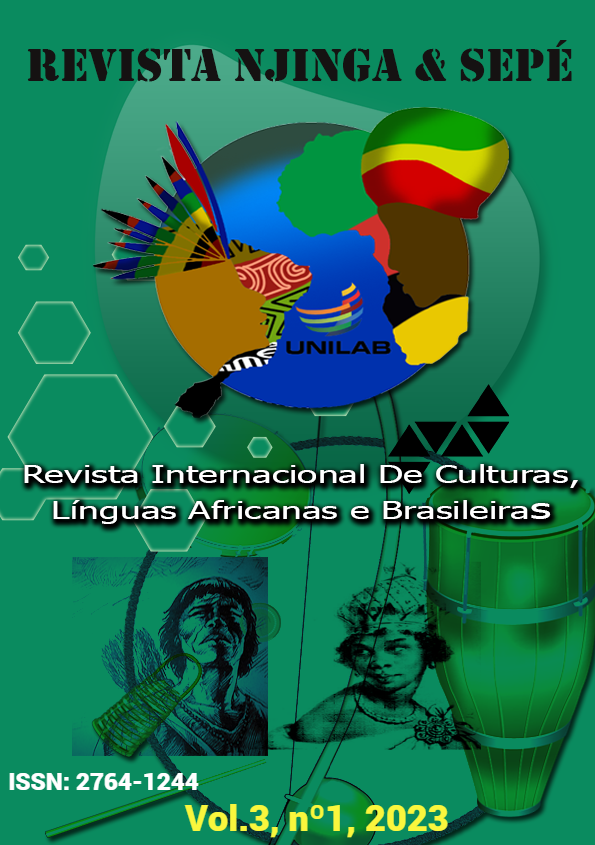O umbundo na esfera educacional da província de Benguela (Angola)
Umbundu kweci catiama kelilongiso kolupale wombaka
Keywords:
Ensino, Línguas angolanas, Valorização linguística, Língua nacional, Língua portuguesaAbstract
This article is the result of a scientific initiation research project, which deals with the ethnic-linguistic valorization of the Umbundu national language in Angola. The objective is to evaluate the teaching-learning process of this Angolan mother tongue as a first language (L1), in relation to Portuguese as a second language (L2), in southern Angola, in the province of Benguela. It focuses on the period of school literacy, that is, when there is the teaching of the written modality of Portuguese, the official language in Angola, competing with the national language. Therefore, the article: presents a contextualization of the education system of the country and the region studied, focusing on a brief literature review; conducts a brief field research with a questionnaire applied to teachers, directors and parents, totaling 14 questions and 11 participantes; compares two primary school study plans. Thus, we seek to understand the difficulty and challenges of implementing the teaching of Umbundu in schools in the province. The study also considers the use of this national language in the family context from the perspective of the parents. The research is relevant because African mother tongue teaching in the context of Angola has been a difficult task to implement due to linguistic prejudices from the colonial era and present until the present day. In a way, we believe that this work contributes to the commitment of the Angolan educational sphere to promoting the teaching of national languages in schools, in line with international guidelines (UNESCO, 2010) to encourage mother tongue teaching as an educational policy of including children in basic education.
Downloads
References
ANGOLA. Lei no. 32/20. Lei que altera a Lei No. 17/16, de 07 de Outubro – Lei de Bases do Sistema de Educação e Ensino. Luanda, Diário da República, 2020.
_____. Constituição da República. Luanda: Imprensa Nacional, 2010.
BERNARDO, Ezequiel. Política linguística para o ensino bilíngue em Angola. (Dissertação de mestrado). Universidade Federal de Santa Catarina, Centro de Comunicação e Expressão, Programa de Pós-Graduação em Linguística, Florianópolis, p. 216, 2018.
CHICUMBA, Mateus. A educação bilingue em Angola e o lugar das línguas nacionais. IV Colóquio Internacional de Doutorandos/as do CES, 6-7 dezembro, 2013.
EDUARDO, Albano A. Ensino bilingue como desafio e passos para mais inclusão no sistema de ensino angolano: Caso Lunda-Norte, 2019-2020. Njinga e Sepé: Revista Internacional de Culturas, Línguas Africanas e Brasileiras. São Francisco do Conde (BA), v.2, n. 1, p.35-57, 2022.
GARCÍA, Ofelia. Bilingual education in the 21st century: A global perspective. Malden, MA: Wiley-Blackwell, 2009.
LUCENA, Maria Inêz. O papel da translinguagem na Linguística Aplicada (in)disciplinar. Revista Da Anpoll, Florianópolis, v. 52, n. 2, p. 25–43, 2021.
KAJIBANDA, Vítor. (2010). Culturas étnicas e cultura nacional: Uma reflexão sociológica sobre o caso angolano. Revista Angolana de Sociologia, Luanda, Vol. 14, n. 3, p. 97-105.
MAKONI, Sinfre, MEINHOF, Ulrike; Linguística Aplicada na África: desconstruindo a noção de “língua”. In: LOPES, Luiz Paulo da Moita (org.). Por uma linguística aplicada indisciplinar. São Paulo: Parábola Editorial, 2006. p. 191-211.
MENEZES, Bernardo Kessongo. Harmonização da grafia toponímica do município de Benguela. (Dissertação de Mestrado). Universidade Nova de Lisboa, Faculdade de Ciências Sociais e Humanas, Lisboa, p. 102, 2015.
MINGAS, Amélia A. Línguas e culturas em Angola: Tuzaba mana malele ke zimbembu ai cinkulu ci basi Nsi Ngola. Njinga e Sepé: Revista Internacional De Culturas, Línguas Africanas E Brasileiras, v. 1, n. 2, p. 377–385, 2021.
PARO, Vitor Henrique; DOURADO, Luiz Fernandes (Org.). Políticas públicas e educação básica. São Paulo: Xamã, 2001.
PATATAS, Teresa; QUINTAS, Joana. Em Angola o ensino bilingue pode contribuir para a educação e manutenção da paz nacional. Revista Transversos, Benguela, vol.1, n. 15, 2019, p. 14-30.
SEVERO Cristine; SITOE Bento; PEDRO José. Estão as Línguas Nacionais em perigo? Lisboa: Escolar Editora, 2014.
SEVERO Cristine; SASSUCO, Daniel; BERNARDO, Ezequiel. Português e Línguas Bantu na educação angolana: da diversidade como ‘problema’. Revista Língua e instrumentos Linguísticos, Florianópolis, v. 43, nº 43, p. 290-307, 2019.
SITA, Francisco. A língua umbundu no ensino primário em Angola: uma abordagem ecológica do currículo escolar. 177f. Dissertação de Mestrado. Universidade do Minho, Ciências da Educação, Minho, 2019.
Downloads
Published
How to Cite
Issue
Section
License
Copyright (c) 2023 NJINGA&SEPÉ: Revista Internacional de Culturas, Línguas Africanas e Brasileiras

This work is licensed under a Creative Commons Attribution-NonCommercial-NoDerivatives 4.0 International License.
Authors who publish in this journal agree to the following terms:
Authors maintain copyright and grant the journal the right to first publication, the work being simultaneously licensed under the Creative Commons Attribution License, which allows the sharing of the work with recognition of the authorship of the work and initial publication in this magazine.
Authors are authorized to assume additional contracts separately, for non-exclusive distribution of the version of the work published in this journal (eg, publishing in institutional repository or as a book chapter), with acknowledgment of authorship and initial publication in this journal.
Authors are permitted and encouraged to publish and distribute their work online (eg in institutional repositories or on their personal page) at any point before or during the editorial process, as this can generate productive changes, as well as increase impact and citation of the published work (See The Effect of Open Access).




